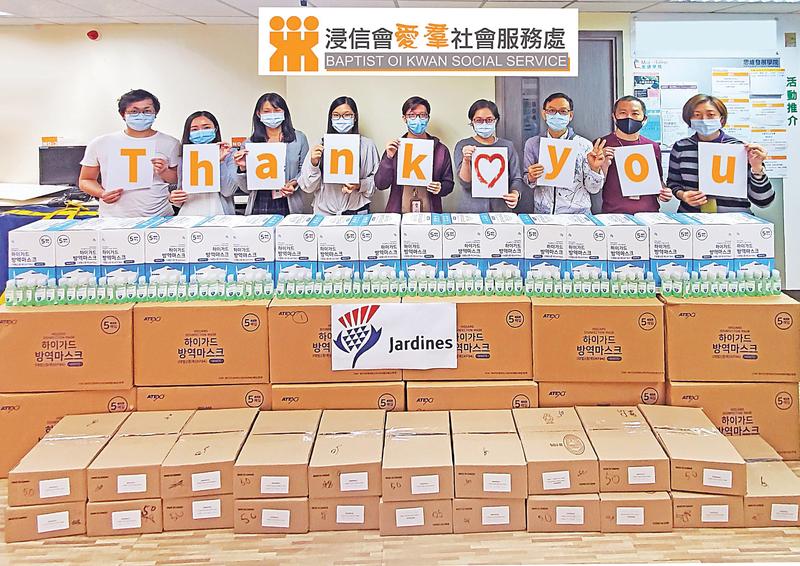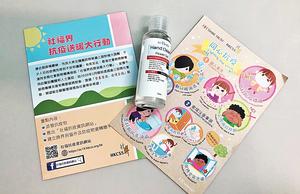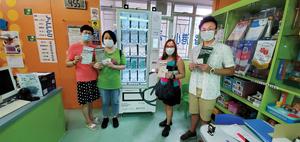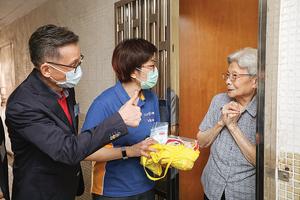Companies with a sustained track record of funding art projects and supporting artists in Hong Kong chipped in to do their bit to help the disadvantaged sections of society during the city’s fight against COVID-19. Mike Lau reports.
 Jardine Matheson has reached face masks and hand sanitizers to people suffering from mental health issues. (PHOTO PROVIDED TO CHINA DAILY)
Jardine Matheson has reached face masks and hand sanitizers to people suffering from mental health issues. (PHOTO PROVIDED TO CHINA DAILY)
More than five months since the city’s first novel coronavirus case was reported on Jan 23, surgical masks, hand sanitizers and sanitizing wipes remain on top of most Hong Kong residents’ shopping lists. In the early days of the onset of the disease, these items had all but disappeared from the local markets or were priced beyond the reach of people with limited means.
Some of Hong Kong’s high-profile corporate entities who have a sustained track record of funding art projects and supporting the city’s artists came forward to help the particularly vulnerable sections of society during the height of the COVID-19 crisis. Hong Kong-based conglomerate New World Development (NWD) acted fast, starting a HK$10 million (US$1.29 million) “community anti-epidemic fund” in late January. The company has distributed more than 2 million locally-produced face masks and 10,000 preventive kits containing the ever-popular hand gel and alcohol wipes as part of the initial drive.
In March, NWD launched its new shared support platform #LoveWithoutBorders with plans to donate 10 million more Hong Kong-made masks to deprived communities in Hong Kong and abroad. Company CEO Adrian Cheng says, “New World Development places great emphasis on education and healthcare, bringing to the forefront the importance of creating shared value across communities worldwide. An important part of that mission is protecting the next generation.”
NWD has since tied up with UNICEF to provide essential safety and sanitation materials to vulnerable children around the world. Some 500,000 masks are being sent to refugee camps to help protect young refugees as well as frontline health workers. “It is my sincere hope that we will help galvanize global efforts to protect children and youth, especially those residing in the world’s most vulnerable zones,” says Cheng.
 Hong Kong Council of Social Service’s initiative to supply hygiene essentials to disadvantaged sections of the community got a fillip from Swire Group. (PHOTO PROVIDED TO CHINA DAILY)
Hong Kong Council of Social Service’s initiative to supply hygiene essentials to disadvantaged sections of the community got a fillip from Swire Group. (PHOTO PROVIDED TO CHINA DAILY)
NWD also launched Hong Kong’s first-ever face mask vending machines. May 25 onwards some 40,000 people from disadvantaged communities have been collecting a pack of five medical face masks every week from machines installed in one of the 37 NGO centers across the SAR’s 18 districts. One such NGO is the Boys’ and Girls’ Clubs Association located in the Wah Kwai Community Centre which serves a sprawling public housing estate in Aberdeen.
Hugo Yeung, a 15-year-old secondary school student who has begun using these masks on a regular basis, says, “The fit is so snug it leaves no gaps. I feel quite warm when I’m wearing it!”
It’s a welcome change from the time Yeung had to wake up at 5 AM to catch a bus to downtown to be able to queue up with hundreds of other people, wishing fervently that the masks did not run out before his turn came, which was often the case.
His neighbour Ng Lai-hong was re-using masks. She says, “I wiped them with a hand sanitizer and also steam-cleaned them.” She still has doubts as to whether that was the right way to go about it but it felt better.
When the crisis eased a little, the masks in the market were often rather substandard, especially given they cost somewhere between HK$250 to 300 a box. Some of these gave off a strong odor.
Candy Chan, who has young children, says, “I would have to add a layer of tissue to bulk out thin masks.”
New World mask dispensers have made the likes of Chan, Ng and Yeung a lot happier. Now all it takes is swiping a smart card to pick up a set of brand new masks from the community center. Users find it reassuring to know that the entire stock is made locally.
Chan says she is confident that a Hong Kong product “is regulated and meets a high standard.”
“My mum says it looks fashionable,” Yeung adds.
 Residents of Wah Kwai can now collect their weekly quota of surgical masks from a vending machine, supported by New World Development. (PHOTO PROVIDED TO CHINA DAILY)
Residents of Wah Kwai can now collect their weekly quota of surgical masks from a vending machine, supported by New World Development. (PHOTO PROVIDED TO CHINA DAILY)
More masks
Among other Hong Kong-based corporate sponsors of art doing their bit to contain the spread of COVID-19 is Jardine Matheson. The company has distributed 179,000 face masks and 30,000 bottles of hand sanitizers to those who need them the most. MINDSET, a charity working in the field of mental health, is helping to distribute the products to Hong Kong NGOs.
“It is wonderful to be able to give back to our community during this difficult time,” says MINDSET’s executive director Jessie Tsui. “We will continue to support our friends in recovery during the pandemic with information and mental health expert advice.”
Among the NGOs they teamed up with is Baptist Oi Kwan Social Service which helps some of the city’s most desperate and neglected people. Its service head Scarlet Poon says, “We really appreciate the thoughtful donation by Jardine. Back in March, many people in recovery hesitated to go for medical consultation because they were worried about not having enough masks. So the donation came at a good time.”
Hong Kong’s flagship carrier Cathay Pacific has seen its revenues nosedive during the global pandemic. However, the setback did not come in the way of parent company Swire, a major sponsor of new performance art in the city, trying to give back to the community in the time of crisis. Swire partnered with the food bank SJS’ FOOD-CO, to help them feed the poor and also donated HK$7.8 million to the Hong Kong Council of Social Service (HKCSS) to support some of the most neglected and disenfranchised members of society. In addition to helping local families, HKCSS has reached out to single-parent families, those with chronic illness, drug addicts, immigrants and ethnic minorities who cannot readily access essential services. Hong Kong residents with roots in South Asia have received pamphlets listing good hygiene practices and social distancing guidelines in Urdu and Nepalese.
 Power supply company CLP visited members of disadvantaged groups to distribute face masks and hand sanitizers. (PHOTO PROVIDED TO CHINA DAILY)
Power supply company CLP visited members of disadvantaged groups to distribute face masks and hand sanitizers. (PHOTO PROVIDED TO CHINA DAILY)
Diversity matters
Despite being forced to close all its off-site betting facilities since early February, the Hong Kong Jockey Club (HKJC), which runs numerous programs to support the creation of new works of art, has been busy with charity activities. It has released a HK$100 million emergency fund and been fast-tracking grants to over 200 NGOs trying to support communities that have suffered financial hardship during the pandemic. HKJC also distributed millions of face masks to the Hospital Authority, and “care packs” of food and hygiene supplies to housebound and low-income families.
HKJC has announced a HK$150 million community sustainability fund. Community service agencies and sports organizations are being invited to submit applications for projects that aim to assist underprivileged and vulnerable members of society impacted by the coronavirus outbreak.
“We hope the community sustainability fund will help small and medium-sized community organizations in providing essential services to the most vulnerable members of society. In doing so we also hope to support the diversity and vitality of the community service ecosystem,” says HKJC CEO Winfried Engelbrecht-Bresges.
Power supply giant CLP teamed up with celebrity chefs and social enterprises to launch a mobile phone app which delivers a range of services aimed at making social distancing more bearable. Users can order a range of food items through the Electric Kitchen Freestyle app. Once the groceries are delivered, users can watch master chefs Kenny Chan, Siu Sau Heung and Hilda Leung demonstrate how to rustle up a good dish.
CLP has also given a boost to the beleaguered catering industry by reaching 80,000 bottles of disinfectant spray to 12,000 restaurants, and distributed thousands of face masks and bottles of hand sanitizers to disadvantaged families through Hong Kong Community Anti-Coronavirus Link.


